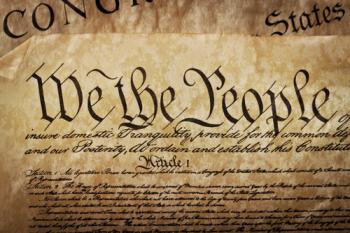The Constitution Overview
 Preamble
Preamble
The Preamble to the Constitution is not vital from a purely legal perspective, as the Preamble does not have any legal value in and of itself. The Preamble is also a very short part of the Constitution, as it is actually a single sentence, and therefore, does not make up any significant part of the Constitution in terms of length. The importance of the Preamble lies not in these two senses, but instead lies in the precedent the Preamble establishes for the rest of the Constitution.
The Preamble was the Founding Fathers' way of informing future generations of their motives and intent in writing the Constitution and it was a way of establishing the most basic principles necessary for consideration of the Constitution. The opening words of the Preamble are "We the People of the United States," which are perhaps the most well-known words in the Constitution. These words are critical to understanding that the Constitution was designed to establish a government empowered by the will of the people and for the good of the people.
The Preamble has often been used by Constitutional scholars in order to determine how other parts of the Constitution should be interpreted, as the Preamble outlines several basic purposes for the creation of the Constitution. Each of these basic purposes provides insight and understanding into the Constitution, but does not actually provide any legal force.
When used in court, the Preamble only ever provides an open guide for interpreting the Constitution and never provides any legal rules that must be followed. This has been proven in a number of cases in which a litigant attempted to argue for his position based on the words of the Preamble. Even though the Preamble does not have such legal power, the Preamble bears great significance for the Constitution as a whole and for any person's understanding of that document.
Following the Preamble, the United States Constitution is divided into seven Articles that comprise the original legislation as it was drafted by the Founding Fathers at the Constitutional Convention: Article I, Article II, Article III, Article IV, Article V, Article VI, and Article VII.
The Framers of the Constitution knew that there would have to be changes made to the document in due time. The changes of the unforeseen future of the United States would bring inevitable changes to the Constitution in order to provide for the well-being of the nation as a whole.
Related Topics
- An Overview of the 7th Amendment
- An Overview of Article 3 of the Constitution
- Article 7
- Election of the Speaker Overview
- An Overview of the 24th Amendment
- A Complete Overview of the Preamble
- An Overview of the 14th Amendment
- TEXT of the Neutrality Act of 1937
- Judicial Review Overview
- Article 1 Overview